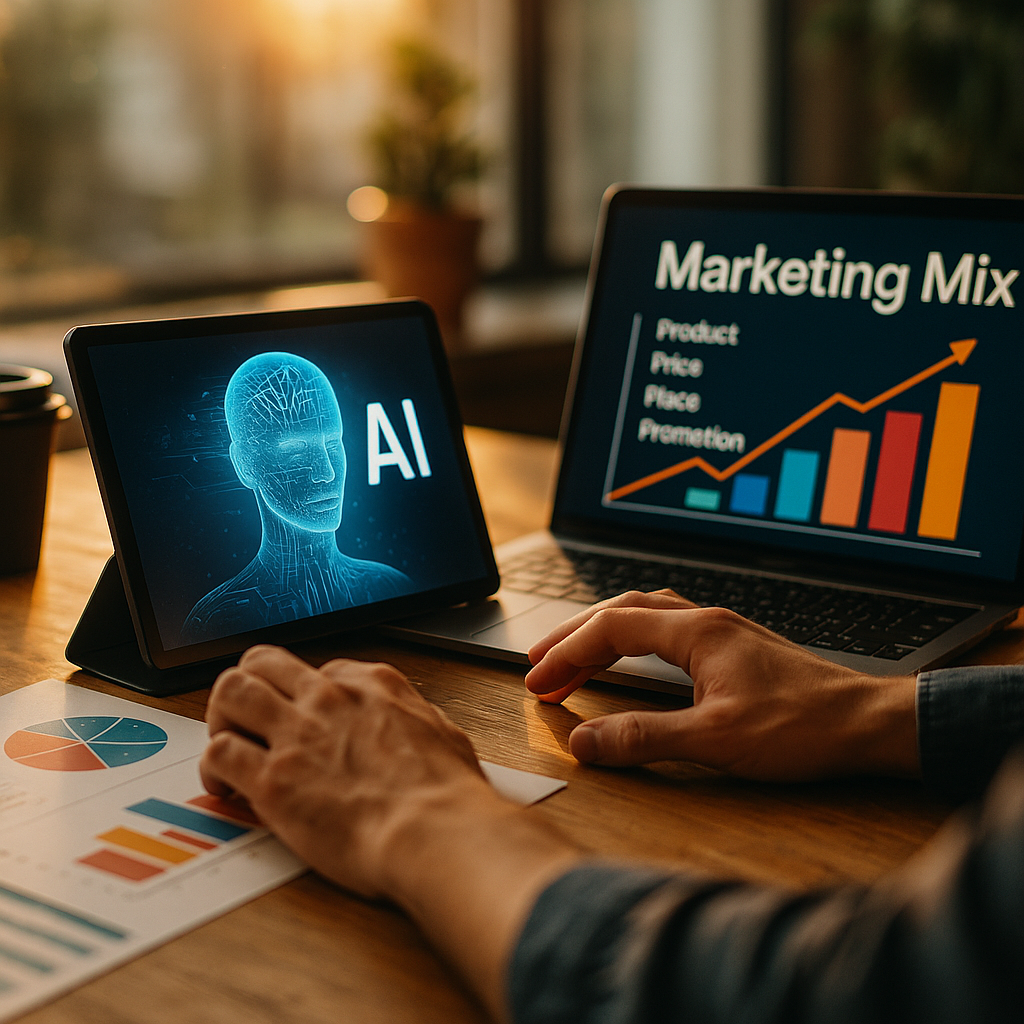Using AI to analyze and optimize your marketing mix is transforming how leading brands drive ROI in 2025. AI tools can uncover hidden insights, automate decisions, and maximize budgets—giving marketers a crucial edge in competitive markets. Ready to move beyond guesswork? Discover how AI-powered marketing mix optimization can help you outpace your competition.
How AI is Revolutionizing Marketing Mix Analysis
In today’s data-rich landscape, traditional marketing analysis methods can fall short. AI marketing mix analysis utilizes machine learning algorithms to review vast datasets across channels, campaigns, and consumer touchpoints. This empowers marketers to see correlations and patterns humans could easily miss. According to a 2025 Statista report, 67% of enterprises now leverage AI-driven analytics to inform their marketing spend—proof that AI is fast becoming an industry standard.
Key advantages AI brings to marketing mix analysis:
- Faster Analysis: AI rapidly processes data from both online and offline campaigns, delivering insights in real time.
- Improved Accuracy: Algorithms identify subtle trends, seasonal effects, or shifts in channel performance.
- Unbiased Reporting: Objective, algorithmic analysis helps reduce human error and subjective bias in data interpretation.
With these enhancements, brands can make better decisions regarding budget allocation and campaign strategy, optimizing for the performance metrics that matter most.
Optimizing Channel Performance with Predictive Analytics
AI-powered predictive analytics allows marketers to forecast how different marketing channels—such as social media, paid search, TV, or email—will perform. AI marketing mix optimization tools use historical and real-time data to simulate potential outcomes based on various investment scenarios.
For example:
- A retailer can predict sales generated from additional spend on Instagram ads.
- A B2B brand can model the ROI of switching budget from trade shows to webinars.
Predictive analytics enables marketers to anticipate diminishing returns and identify the true incremental value of every channel. By doing so, companies stay agile, moving resources to the channels and tactics with the highest projected ROI in 2025’s rapidly changing markets.
Personalizing Marketing Strategies at Scale
AI isn’t just about optimizing where you spend, but also how you interact with audiences. Data-driven personalization uses customer and behavioral data to tailor messaging, offers, and timing for maximum impact. With AI marketing mix personalization, brands can:
- Build hyper-relevant segments based on purchase intent, browsing activity, or demographics.
- Automate delivery of personalized content across email, web, and paid advertising channels.
- Continuously refine creative and messaging based on real-time feedback and conversion data.
This level of personalization demonstrates an understanding of the customer—building trust, increasing engagement, and driving up conversion rates across the entire marketing mix.
Real-Time Budget Allocation and Automated Decision-Making
With hundreds of data signals from website analytics, CRM platforms, and ad networks, managing budget manually is inefficient. AI marketing mix optimization software automatically allocates budgets to top-performing channels, pausing or ramping up spend based on live performance data. Features include:
- Automatic reallocation: Shift funds instantly to ads or channels outperforming benchmarks.
- A/B Testing Automation: Run continuous split tests and adjust creatives or placements on the fly.
- Performance Monitoring: Set KPI thresholds for AI to flag or action spend changes, all in real time.
This autonomous approach minimizes wasted spend and ensures every marketing dollar is working as efficiently as possible. In a 2025 Deloitte survey, marketers using AI-driven budgeting reported a 22% boost in campaign ROI compared to those using manual allocation models.
Ensuring Data Quality, Transparency, and Compliance
AI-powered marketing mix analysis is only as effective as the data it’s built upon. Marketers should prioritize data accuracy, source transparency, and adherence to evolving privacy regulations. In 2025, reputable AI vendors offer:
- Clear methodologies: Transparent algorithms and model documentation that marketers can understand and validate.
- Privacy safeguards: GDPR and CCPA-compliant data practices, with built-in controls for consent and user anonymity.
- Continuous data enrichment: Automated detection and correction of anomalies or missing data for reliable analysis.
Choosing solutions with strong data handling standards protects your brand reputation and ensures AI insights are both ethical and actionable.
The Future of AI in Marketing Mix Optimization
As AI technology evolves, so too will the capabilities for optimizing the marketing mix. In 2025, emerging trends include:
- Multi-touch Attribution: AI models that account for the full customer journey, not just last-click conversions.
- Natural Language Processing: Advanced sentiment analysis and social listening that inform campaign creative in real time.
- Integrated Creativity: AI-generated ad copy or design paired with performance data for seamless execution and optimization.
Staying ahead means regularly updating your tools, upskilling teams, and reviewing best practices for responsible AI use.
FAQs: Using AI to Analyze and Optimize Your Marketing Mix
-
What is AI marketing mix optimization?
AI marketing mix optimization uses artificial intelligence to analyze data from multiple marketing channels and campaigns, then recommends or automates strategies to maximize return on investment.
-
Which types of businesses benefit from AI-driven mix analysis?
Any business running multichannel campaigns can benefit—from ecommerce and retail to B2B and service industries. The larger and more complex your marketing spend, the greater the potential impact.
-
How does AI handle privacy and compliance?
Leading AI solutions offer GDPR, CCPA, and privacy law compliance features. This includes data anonymization, consent management, and clear reporting on how data is used.
-
Is AI replacing marketers in mix planning?
No. AI acts as an intelligence layer, supporting marketers with deeper insights and automated tasks. The strategic direction and brand voice still rely on human expertise and oversight.
-
What challenges should I expect with AI marketing mix solutions?
Challenges include ensuring accessible and high-quality data, selecting the right AI tools, integrating with existing systems, and providing adequate team training in data literacy and ethical AI use.
In summary, using AI to analyze and optimize your marketing mix empowers marketers to make data-backed, agile decisions that boost ROI. By leveraging predictive analytics, real-time budgeting, and advanced personalization, brands position themselves for success in a fast-evolving digital landscape—let AI take your marketing mix to the next level in 2025.
